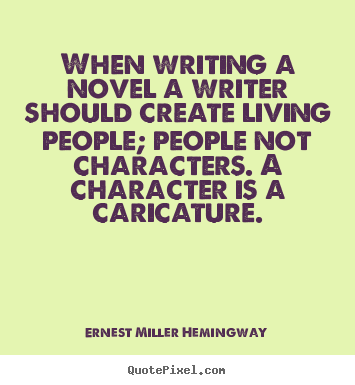Creative Writing 101: Types of Characters

Ah, characters. The little voices in our heads, our imaginary friends, our sons and daughters of paper and ink, our creations. They are perhaps the closest companions of a writer, and their crafting is probably the most fun part of the whole writing process. Characters are a crucial part of stories, they are as important and influential as the main plot. A logical plot can carry a story, but compelling characters can save even the most draggy plot lines, and make a readers' time worth their while.
Types of Characters
When learning about characters, the first thing to do is understand what a character is and some of the categories that characters fall under. According to the Oxford dictionary of Literary Terms, a character is a “personage in a narrative or dramatic work”. Characters are the people or personages that exist in the Literary Universe where the story occurs. There are different types of characters. We all know the main types like protagonists, antagonist, and supporting characters. We know their purposes left and right. However, these are not the only types of characters there are, and their existence is of importance to the flow of the plot. They are:
Major: These characters are vital to the movement of the story. Without them, the story cannot move along. The main plot and all the events in the story revolve around these characters.
Minor: These kind of characters complement the major characters and their only purpose is to move the story forward. Through characters like these writers often present exposition.
Dynamic: This term refers to personages that change over time. They are the ones that actually go through a character arc. This means that from the beginning of the story, a character has a certain personality or attitude towards life. By the end, a dynamic character has moved to a different state of mind. This is more of a character trait than a category. Protagonists are often dynamic, because they solve issues around themselves and at the same time they solve problems they hold inside of them. However, they are not the only ones that can hold this trait. Anti heroes, anti villains, supporting characters and others can be dynamic too. It's all about the change.
Round: A round and a dynamic character are often confused. Since the dynamic character is the one that changes, people often refer to them as round character. Nevertheless, there is a marked difference between these two characters. A round personage is one that has a complex personality. They are often conflicted. They are the characters that hop from the good side to the bad quite often and that have complicated backstory. Round characters often present mental illnesses or traumatic events in their back stories that push them to the evil side.
Foil: Often a minor type or an antagonist. These characters have specific traits that will bring out the positive qualities in your protagonists or secondary characters. If, for example, you want to make your readers see how brave your main character is, and in turn make him more likeable, you could make another character a coward in a despicable manner. Basically, this coward will make your protagonist look good.

Archetypes
An archetype can be a typical situation, event, or character that has become universal. Under the concept of characters, we sometimes refer to archetypes as stock character.
A stock character is a cliché, a conventional and repetitively used character. Some of the most common archetypes are:


The Hero: This is the character that takes the protagonist's role. The chosen one, the one that goes out of his comfort zone to face evil or adversity.
The Mentor: This is the character that guides the hero at the beginning of the story. This is the person who teaches the hero the ropes.
The Fool: An optimistic character who serves as a symbol of hope, and has always time to jest.
The Star-Crossed Lovers: Romeo and Juliet. A couple of lovers that are destined to a tragic end. Through them, other characters learn valuable lessons. In Shakespeare's Romeo and Juliet, after their untimely deaths their families make peace.
Readers can spot these characters right away, because they have been used for the longest time in storytelling. This is not always a bad thing. Archetypes have become a cookie cutter for characters. We all know them, and as writers, we can use this to our advantage. Archetypes should be taken as friendly suggestions when constructing a character, not guidelines. We can take some of the traits of an archetype and change some details, some actions, some decisions our characters take, in order to make them original and help them stand out. This way, we can surprise the reader and make them identify with these characters.
As humans, we all have similar problems and insecurities. We all make mistakes, we all find ourselves in difficult situations where we have to choose between good and evil, we make decisions we later regret, and struggle to leave our guilt behind. However, these characters overcome these same issues one way or another and for that they are worthy of our admiration. Characters should have flaws, because flaws make them more human. Characters can follow some of the archetypal guidelines, so we can identify with them easily, but their actions should break the cookie cutter a little in order to be believable and more original.







